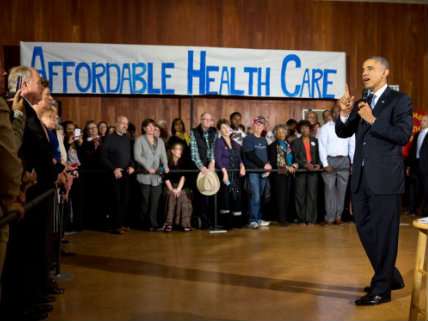National Health Spending Growth Is Accelerating Again. Thanks Obamacare!

Over the past few years, the Obama administration has, on repeated occasions, implicitly credited Obamacare with substantially slowing the growth of national health care spending.
In November of last year, for example, President Obama said that "Despite some of the previous predictions, even as we've enrolled more people into the Affordable Care Act and given more people the security of health insurance, health care inflation has gone down every single year since the law passed, so that we now have the lowest increase in health care costs in 50 years." Obama did not explicitly say that the health law caused the decline, but that's the clear implication. In addition, as The Washington Post noted at the time, it's not quite true that spending growth dropped every year; the 2013 estimate reported a small increase from 2012.
A White House blog post published a month before Obama's statement was even more direct in drawing a causal link between the law and slow growth in U.S. health spending. The post opened by noting new government estimates indicating that "national health expenditures rose at historically slow rates in 2013, continuing the exceptionally slow growth in health costs seen in recent years. This slow growth, which is thanks in part to the Affordable Care Act, is already generating major benefits for both the Federal budget and our economy." The post carefully says later on that Obamacare is not the only factor. It is, however, the only one highlighted in the first paragraph.
The link between the health care law and the slowdown in health spending growth has always been weak. Several studies have found that the economic recession was responsible for the vast majority of the reduction in growth. (A related slowdown in Medicare spending was, according to one study, mostly a result of the prescription drug benefit passed during the Bush administration.) The suggestion that Obamacare was significantly responsible for the slowdown was never very plausible anyway, given the timing: Most of the law's major features didn't take effect until the beginning of 2014, years after the slowdown started.
A report released yesterday estimating that the growth in national health spending has accelerated renders the link even weaker still. In fact, it strongly suggests that Obamacare's coverage expansion is now causing health care spending to accelerate back to levels not seen since before the recession.
After several years of historically low, sub-4 percent growth, national health spending is now expected to rise at 5.5 percent in 2014—the highest its been since 2007—actuaries at the federal government's Centers for Medicare and Medicaid Services (CMS) reported yesterday. The report further projects that growth will increase slightly, on average, over the next decade, to 5.8 percent. The authors write that the latest growth estimate "primarily reflects" the effects of the health law's major coverage expansions, as well as renewed economic growth and an aging population. Of these factors, Obamacare is the most significant, at least for the moment. The accelerated growth in 2014, the authors write, was "mostly driven by health insurance coverage expansions under the ACA, as 8.4 million Americans are anticipated to have gained insurance coverage primarily through Medicaid or the new health insurance Marketplaces."
Obamacare isn't holding spending growth down to historically low levels. It's helping to accelerate the growth of health spending following a brief, temporary slowdown.
This is, in some sense, by design. The law expands coverage to millions of people, and studies have found that the expansion of coverage tends to lead to greater utilization of health care services. The Oregon Health Insurance Experiment, a randomized controlled experiment in which a group of people were assigned Medicaid and then tracked along with a group who were not, found that the people who got coverage under the experiment used more health care, and that, in general, coverage served as a financial shock absorber. Another study of the health law's effects published yesterday in the Journal of the American Medical Association (JAMA) found similarly that, following the implementation of Obamacare, people reported better access to medicine and physicians, as well as greater ability to afford care—all factors that suggest an increase in utilization.
As in the Oregon experiment, the JAMA study found an increase in self-reported health status. But the Oregon experiment gives us reason to doubt those findings; despite the self-reported increase in feelings of health, researchers were unable to detect any significant improvements in objective measurements of physical health.
The Oregon study looked at Medicaid, not private health insurance. But even still, the results of the Oregon experiment may turn out to be similar to the outcomes for Obamacare: Greater coverage, insulation from medically related financial shocks, expanded access to providers and utilization of health care services—but no clear overall improvement on actual health. In the meantime, the law's expanded coverage, and the increased use of health care services it allows, will contribute to the nation's ever-growing health care spending. So we'll be paying for health care—but not for health.


Show Comments (59)